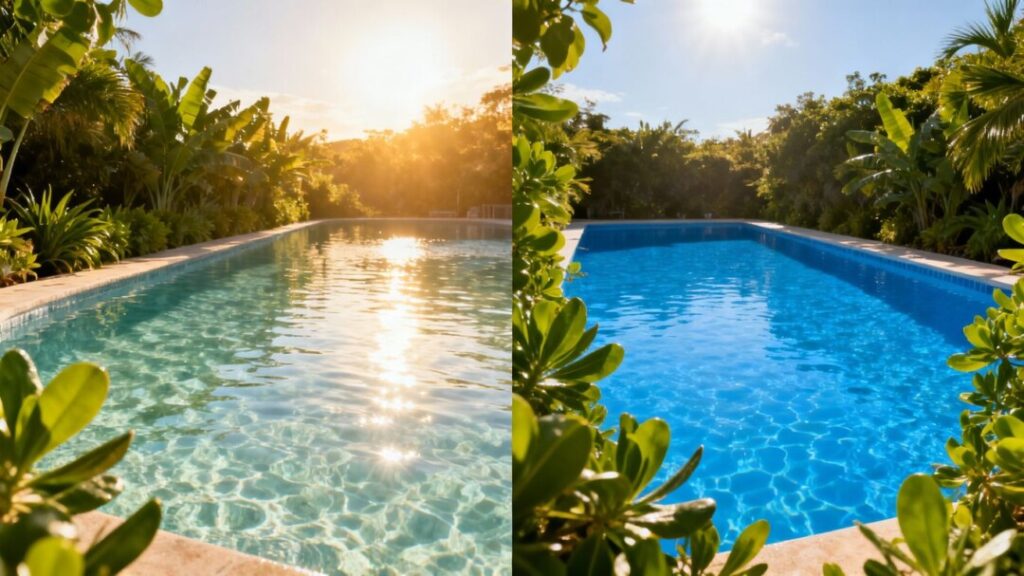Choosing between a saltwater and a traditional chlorine pool involves weighing various factors, from initial investment to long-term maintenance and the overall swimming experience. Both systems effectively sanitize water, but they achieve this through distinct mechanisms, leading to different benefits and drawbacks for homeowners.
Key Takeaways
- Saltwater pools use a generator to convert salt into chlorine, offering a gentler swimming experience and potentially lower daily maintenance.
- Chlorine pools rely on manual addition of chlorine products, providing a lower initial cost and a straightforward, proven sanitation method.
- The choice depends on budget, maintenance tolerance, and personal preference for water feel and chemical odor.
Understanding Saltwater Pools
A saltwater pool system utilizes a salt chlorine generator. This device converts salt (sodium chloride) added to the water into chlorine through electrolysis. The generated chlorine then sanitizes the pool, and as it dissipates, it reverts back to salt, creating a continuous cycle that minimizes the need for manual chlorine additions.
Understanding Chlorine Pools
Traditional chlorine pools require the direct addition of chlorine compounds, such as tablets, granules, or liquid, to maintain water sanitation. This method involves regular testing and manual adjustments to ensure the water remains safe and free from bacteria and algae. It’s a long-established and widely understood approach to pool care.
Saltwater Pool vs. Chlorine Pool: A Comparative Look
| Feature | Saltwater Pool | Chlorine Pool |
|---|---|---|
| Sanitization | Salt chlorine generator (electrolysis) | Manual addition of chlorine products |
| Water Feel | Softer, silkier | Can feel harsher on skin and eyes |
| Maintenance | Lower day-to-day upkeep | Requires regular chlorine application |
| Initial Cost | Higher (generator installation) | Lower setup cost |
| Ongoing Costs | Lower chemical costs, potential repair costs | Regular chemical purchases |
| Smell | Minimal chlorine odor | Noticeable chlorine smell |
| Equipment Impact | Can be corrosive to metal parts | Generally easier on pool surfaces |
Pros and Cons of Saltwater Pools
Pros:
- Gentler on skin and eyes, reducing irritation.
- Lower chemical maintenance due to self-regulating chlorine levels.
- Minimal chlorine odor.
- Provides a softer water texture.
Cons:
- Higher initial cost for the generator installation.
- Salt can be corrosive to metal components and fixtures.
- Generator repairs or replacements can be expensive.
- Increased energy consumption due to the generator.
Pros and Cons of Chlorine Pools
Pros:
- Lower initial setup costs.
- A familiar and proven sanitation method.
- Easier to perform quick shock treatments for contamination.
- Simpler system with less complex troubleshooting.
Cons:
- Requires frequent monitoring and manual chemical additions.
- Can produce a stronger, more noticeable chlorine odor.
- May cause skin dryness or eye redness.
- Involves handling and storing chemicals, posing potential risks.
Cost Considerations
Initial Costs: Saltwater pool systems typically range from $1,500 to $2,500 for the generator, plus installation. Chlorine pools have a much lower initial chemical setup cost, around $300 to $800.
Annual Maintenance Costs: For saltwater pools, expect $70-$100 for salt refills annually, with generator cell replacement every 3-7 years costing $300-$900. Total annual costs, excluding repairs, are estimated at $200-$400. Chlorine pools require $300-$600 per year for chlorine products and $50-$100 for testing kits, totaling $350-$700 annually.
Maintenance Tips
Saltwater Pools: Regularly check salt levels (aim for 2,500–3,500 ppm), clean the generator cell, monitor pH and alkalinity, and inspect for corrosion. Proper winterization is crucial in colder climates.
Chlorine Pools: Test water weekly, shock the pool periodically, store chemicals safely, and frequently brush and vacuum the pool to remove debris and prevent algae. Balancing other chemicals like stabilizer and calcium is also important.
Making Your Choice
Opt for a Saltwater Pool if: You prioritize lower daily maintenance, prefer a gentler swimming experience with less odor, and are comfortable with a higher upfront investment.
Opt for a Chlorine Pool if: You are budget-conscious regarding initial costs, are comfortable with regular chemical maintenance, and prefer a straightforward, well-understood system.


